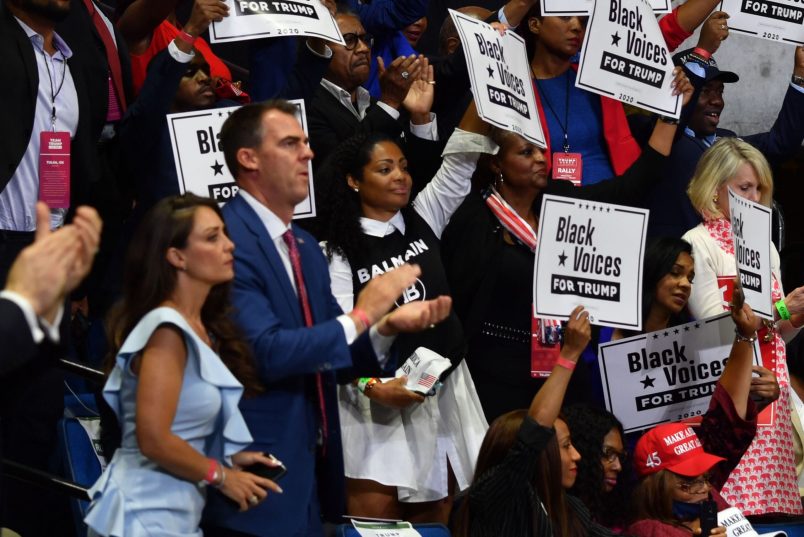The sprawling Fulton County indictment against former President Donald Trump and 18 co-defendants for their alleged efforts to reverse the results of the 2020 presidential election includes a brief recounting — and a set of charges — related to one of the more bizarre episodes mounted by Trump and his allies in the final days of 2020.
This particular episode centers on three individuals — Rev. Stephen Lee, Harrison Floyd, and Trevian Kutti — who District Attorney Fani Willis, in the indictment, accuses of “harassment and intimidation” directed toward a local election worker, Ruby Freeman.
TPM has extensive new reporting on the events leading up to the trio’s efforts to pressure Freeman, documenting in new detail how the key players in the alleged scheme were linked to Trump’s campaign team and allies, including the “Black Voices For Trump” organization, the “My Pillow” pitchman and prominent election denier Mike Lindell, and the vast network of attorneys who were working with the former president to challenge the election result.
The story of how the election plot ended up on Freeman’s doorstep is a complex and winding tale involving one of the most persistent “Big Lie” conspiracy theories, the eccentric rapper-turned-Hitler enthusiast Ye, frantic 911 calls, and a chaplain who viewed himself as a first responder for “demonic births.” It all culminated in Kutti’s January 2021 visit to Freeman’s home. During that meeting, Kutti warned Freeman that she might be in unspecified danger if she did not admit to thoroughly debunked voter fraud allegations.
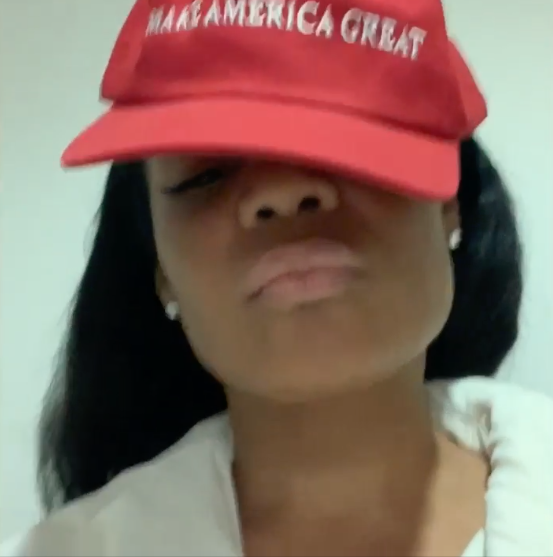
There has already been extensive reporting about the visits to Freeman’s home. In 2021 and 2022, Reuters published a series of stories describing Kutti and Lee’s role in the incidents. I was the first reporter to definitively identify Floyd and his part in the episode in a pair of articles on Substack. However, even if you have heard some of this story before, the full picture that we can now paint shows both the importance and the utter strangeness of this moment in Trump’s battle to thwart the vote. The new information that we are revealing here for the first time includes previously unreported comments from one of the co-defendants, social media posts that point towards Trump’s White House, and allegations of Kutti’s past “weird and unsettling” behavior.
Willis’ indictment is the fourth against the former president in recent weeks and the second related to his attempts to stay in power after losing the 2020 election to President Joe Biden. In a brief press conference after the indictment was unveiled, the district attorney described the alleged charges as the result of a “criminal conspiracy to overturn the results of the 2020 presidential election in this state.” The alleged conspiracy included multiple visits to Freeman’s home that the indictment described as being orchestrated by Lee, Kutti, and Floyd. All three were charged with one count each of conspiracy to commit solicitation of false statements and writings, one count each of influencing witnesses, and one count each, along with all the other co-defendants, of violating Georgia’s Racketeer Influenced and Corrupt Organizations Act. Lee alone was charged with two additional counts of criminal attempt to commit influencing witnesses.
Lee, Kutti, and Floyd did not respond to multiple requests for comment on this story. Spokespeople for Willis’ office also did not respond to requests for comment for this story.
The Chaplain
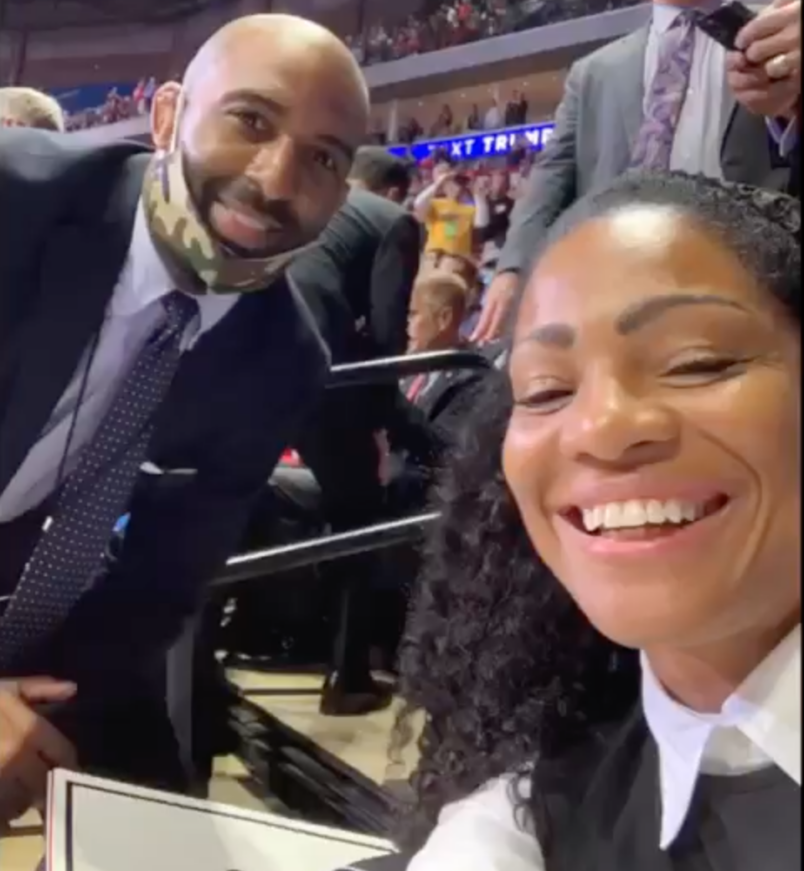
On the surface the three co-defendants seem like an unlikely group. Lee is an elderly Lutheran pastor. Floyd is a brash failed congressional candidate, former Marine, and political operative who bills himself as an “entrepreneur” and “MMA fighter.” Kutti is a veteran entertainment industry publicist who has worked with Ye, then known as Kanye West — who was technically Trump’s rival in the 2020 presidential race — and other celebrities. Despite their differences, the trio have one thing in common: Trump.
Both Lee and Kutti found themselves at Freeman’s home after Trump helped spread an elaborate conspiracy theory around surveillance footage of ballots being counted. Freeman and her daughter, Wandrea “Shaye” Moss, worked together at the State Farm Arena in downtown Atlanta, one of the locations where votes were processed. In the wake of the election, Trump and his allies began making claims that videos showed the pair pulling out “suitcases” of ballots and improperly adding them to the vote total. These allegations were baseless: Officials at every level of government, including Republicans and members of the Trump administration, have confirmed there was no widespread fraud in the 2020 presidential race. Georgia’s result was checked in two separate recounts. Footage of Freeman and Moss was subjected to multiple detailed reviews and fact checks that confirmed the supposed “suitcases” were official ballot containers and thoroughly debunked any supposed impropriety.
Despite the facts, bogus conspiracy theories about Freeman and Moss were heavily promoted by Trump’s team, including attorney Rudy Giuliani, who worked on efforts to challenge the election and was named in Willis’ indictment.
Trump himself brought up the footage of Freeman and Moss at multiple rallies and on an infamous phone call where he pressed Georgia’s Republican secretary of state to “find” him extra votes. During that call, which featured prominently in the indictment, Trump invoked Freeman’s name 18 times. The attention led to a wave of threats against Freeman and Moss. Strangers also repeatedly showed up at their homes. Two of those strangers were Lee and Kutti.
According to the indictment, Lee, who lives in Illinois, traveled to Freeman’s Georgia home on December 15, 2020 and knocked on her door with what prosecutors described as “intent to knowingly engage in misleading conduct … by purporting to offer her help, and with intent to influence her testimony in an official proceeding.”
Reuters was first to report Lee’s visit to Freeman in a story published last September that detailed his career, which has been a blend of law enforcement work and religious ministry. The wire service reported Lee was a sergeant for the sheriff’s office in California’s Mendocino County during the 1980s. He subsequently helped found Peace Officer Ministries Inc., an organization dedicated to providing “spiritual care, consulting, training, and written materials (including a special edition tactical Bible for officers)” to the law enforcement community. According to Reuters, Lee worked with that group until 2010 before leading a “Quick Response Team” that was sponsored by a Lutheran church in Illinois. A since-deleted webpage claims Lee also previously worked for the Navy’s law enforcement agency, which is now known as the Naval Criminal Investigative Service (NCIS), and noted that his “QRT” was dedicated to having chaplains maintain a presence at “critical incidents both locally and around the country to provide Christian compassion, care and comfort for both victims and first responders.”
In posts on the now-deleted “QRT” site, Lee indicated he served as a chaplain at Ground Zero in the aftermath of the Sept. 11 attacks and described the disasters and violent incidents he focused his work on as “demonic births.” Lee also boasted of his ties to the Trump White House in “QRT” newsletters that were first highlighted by Reuters.
In February 2017, one month after Trump took office, Lee shared a photo of himself standing outside the Manhattan headquarters of the former president’s real estate company.
“The president has issued a clarion call to make America great again and drain the swamp. No matter how we voted in the recent election, we should all support these noble goals. In responding to the president’s call, shortly before the inauguration … I traveled to Trump Tower in New York,” Lee wrote. “There I briefed a Trump transition team advisor on a volunteer federal law enforcement chaplaincy proposal.”
Roughly one year after that update, with Trump about halfway through his term Lee wrote that the “QRT” would “need to operate with a lower public profile” and shut down its “online media” presence. Lee indicated this was the result of an unspecified opportunity to work with Washington.
“As needed and able, QRT continues to respond to crises, but we now have an opportunity to work more directly with the federal government,” Lee wrote. “I am currently in conversation (even today) with the ‘feds’ about these opportunities for partnership.”

Even as he wound down his organization’s public activities, Lee indicated he was still willing to accept donations. In its report on the chaplain, the Reuters team noted that they “could not confirm what work, if any, Lee did for the Trump administration.”
Lee’s efforts to connect with Freeman in the days after the 2020 election were not as successful as his purported collaboration with the “feds.” Willis’ indictment alleges that the chaplain was rebuffed by Freeman and that, in the weeks following his visit to her house, Lee “solicited” Floyd to “assist” with the attempts to speak to the election worker.
‘A Plan Of Action’
Floyd had been the executive director of “Black Voices for Trump,” which was the centerpiece of the 2020 Trump campaign’s effort to win over Black voters. The indictment alleged that Lee told Floyd that he felt Freeman “was afraid” to communicate. According to the prosecutors Lee attributed Freeman’s reluctance to talk to the fact he “was a white man.”
Reuters reported that Freeman was so disturbed by Lee’s presence that she called 911 three times. Body camera footage reviewed by the news organization showed Lee attempting to explain himself to a responding officer.
“I’m a pastor, and I’m also working with some folks who are trying to help Ruby out,” Lee said.
I talked to Floyd in December 2021 when I was the first to detail his role in the attempts to pressure Freeman. During our conversation, Floyd refused to name Lee, but said he was brought into the situation by a mysterious and unnamed “chaplain who has a background in law enforcement.” Floyd’s account of an initial visit by this chaplain to Freeman’s home lines up with the description of Lee’s visit in the indictment and with Reuters’ reporting on it. Floyd claimed the chaplain had previously attempted to contact Freeman and felt the election worker was “super skittish and scared … because he was an old white man and she was a Black woman scared in Georgia.” As a Black man, Floyd said he decided to get involved.
“I’m a Black guy, I’m from Georgia, and I know how they do Black folks down in Georgia,” Floyd told me.
In light of the indictment, I went into my archives and reviewed my initial interview with Floyd. This story includes parts of that conversation that have never before been published.
Floyd indicated Lee was not the only person who was reaching out to him about Freeman. He suggested that the December 2020 call he received from the “chaplain” came only after he had already heard “chatter” that Freeman was “seeking immunity” for unspecified reasons and that she “wanted to get this message to the president.” While Floyd repeatedly insisted that he was “not really comfortable with giving out anybody’s names or any specifics right now,” he identified the people reaching out to him as attorneys who were in a position to help Freeman contact Trump or avoid prosecution for the supposed voter fraud Trumpworld had falsely accused her of.
“Lawyers and different people from all across the country were asking me, you know, if I had heard anything and they were saying, ‘Well, if she wants immunity, let her know that I would be able to give it to her, so reach back out to me if you hear something,’” Floyd recounted to me in 2021, later adding, “My phone was going off nonstop about this. I was getting over-inundated from people in Michigan, in, you know, Pennsylvania, in North Carolina, and Georgia, Arizona, like literally all across the country people were pinging me on this.”
Floyd said that he and the chaplain participated in conversations together with some of these unnamed individuals who had previously contacted him about Freeman. Floyd claimed some of the people who spoke with them were lawyers who offered guidelines for offering Freeman “immunity,” which is typically granted by a prosecutor or court.
“We had another call or two with other people on the line. I think they were attorneys. They were telling me, like, about an informal proffer agreement,” Floyd told me in 2021. “Like … if I talked to her, like, that’s what I’d need to do and, like, this is the lane that I’d need to be in and they gave me very clear parameters in having a discussion with her.”
Floyd stressed that he did not feel this project was related to his official role on Trump’s 2020 campaign team.
“As of Nov. 15, I was off the Trump campaign. I was no longer doing any work and anything I was doing with or for anybody was in a personal capacity, personal basis,” said Floyd. “Their background does not matter in this context.”
While he declined to reveal who he was working with, Floyd made clear that the plan, as he understood it, was to get Freeman out of Georgia and into direct contact with Trump.
“I had, you know, already spoken with some people that I knew and they were all in agreement that, if Ms. Freeman was in fact in danger, and she needed help, and she was seeking immunity, and she needed to get a message to the president, and she needed immunity for her and her daughter that that should definitely be done. She should be taken care of,” Floyd said.
“Those individuals were willing to assist me if I could confirm for them that that was in fact the case,” he added. “So there was already a plan of action, there was already a location where we were going to move her.”
‘She Had All These Connections’
Floyd tried to call and text Freeman on Jan. 3, 2021, the indictment alleges, but was unsuccessful. He lived in Washington, and was unable to make the trip to Freeman’s home himself. So, according to the indictment, he “recruited” Kutti.
Much of the reporting on Kutti thus far has focused on her ties to West. However, she also had deep links to Trump’s campaign — some of which are being reported here for the first time — that put her on Floyd’s radar.
“I had already known Trevian through the campaign,” Floyd told me in 2021. “I had met her at a Trump rally; she had been to a bunch of different Black Voices events. People were saying she had all these connections … I was aware of who she was.”
Floyd placed a series of calls to Kutti, the indictment alleges. Kutti’s visit to Freeman came on Jan. 4, 2021. The indictment alleges that Floyd was in touch with Kutti and Lee throughout this period.
As Kutti traveled to Freeman’s home, she was accompanied by a man who was later identified as Garrison Douglas, a local GOP operative. The indictment referred to Douglas, who is currently the press secretary for Georgia Gov. Brian Kemp and was not charged with any crime, as “a certain individual, whose identity is known to the Grand Jury.” Douglas did not respond to a request for comment on this story.
According to the indictment, Kutti initially called Freeman and warned the election worker was in “danger.” The indictment quoted Kutti offering to “help” and said she suggested Freeman meet with her at a local police station.
The discussion they had there became public in December 2021 when Reuters obtained body cam footage of the meeting and reported that Freeman called 911 because she was concerned about Kutti.
In the partial video of their sitdown at the police station, Kutti pressed Freeman to “tell everything” and admit to being involved in voter fraud. Kutti again warned Freeman that she was “in danger” and suggested that something was imminently set to “take place” that would “disrupt your freedom … and the freedom of one or more of your family members.”
“There are federal people that are involved here,” Kutti said.
Throughout the conversation, Kutti urged Freeman to work with Floyd, who she indicated had “authoritative powers to get you protection.” Kutti even called Floyd to connect him with Freeman via speakerphone.
A Seat At The Table
Most of the reporting on Kutti’s cameo in the madcap scramble by Trump and his allies to reverse his Georgia loss has focused on her work as a publicist for West and other celebrities. However, an in-depth review of her social media presence indicates Kutti had substantial involvement with Trump’s White House, his campaign team, and some of his more prominent allies. It’s a digital trail that directly links Trump’s organization to the strange scene at Freeman’s home.
Kutti has been a prolific social media user, and she detailed her links to Trump and his team in a series of Facebook posts. On Feb. 12, 2020, Kutti posted that she had “accepted” an invitation to a “National African American History Month” hosted by Trump at the White House. She included an image of the invitation. About two months later, Kutti shared another image indicating that she was included on an “African American Stakeholders Conference” call held by Trump’s White House Coronavirus Task Force.
“I told y’all imma keep us at the table,” Kutti wrote.
Kutti also posted about joining “African American Stakeholders Conference” call on Trump’s “School Choice Now” plan in October 2020. Spokespeople for Trump and his 2024 campaign did not respond to a request for comment about his ties to Kutti.
In another Facebook post, Kutti suggested her dealings with Trump’s White House went beyond participation in events and phone calls.
“I have personally worked with this administration and its affiliates to bring black men unjustly sentenced under Biden’s crime bill home. So far over 7,000 black men have been reunited with their families under Trump,” Kutti wrote on Oct. 19, 2020.
West, Kutti’s star client, has involved himself in Trump’s criminal justice reform efforts earlier in the administration. In a freewheeling 2018 Oval Office meeting, West discussed police stop and frisk policies and pressed the former president on pardons.
While West initially positioned himself as a Trump supporter during the first half of the former president’s term, he ultimately launched his own White House bid during the 2020 election. West’s campaign failed to get on the ballot in most states and only garnered about 60,000 votes. The presence of multiple Republican operatives on his staff led to speculation his candidacy was designed to help Trump split up the electorate. In a 2020 interview with actor Nick Cannon, the rapper denied being in “cahoots” with Trump. In her multiple Facebook posts throughout 2020, Kutti promoted both West and Trump’s campaigns.
For his part, Floyd told me in 2021 that he had no idea whether Kutti was working with West or on his presidential bid.
“I have no idea about what was factually going on with her in any capacity other than what transpired with this phone call and what happened,” Floyd said, referring to the effort to contact Freeman.
When the news broke, in late 2021, of Kutti’s visit to Freeman, Pierre Rougier, a spokesperson for the rapper, issued a statement declaring that Kutti was “not associated with Kanye West or any of his enterprises at the times of the facts that are reported in various articles or since these facts occurred.” However, in July 2021, Kutti shared video that suggested she was with West at an event in Atlanta.
Since then, West, who has already announced his intent to be a candidate in the 2024 election, has become mired in controversy after making a series of anti-Semitic comments and associating with far-right activists, including neo-Nazi Nick Fuentes. TPM emailed Rougier to ask for a definitive timeline of Kutti’s work with the rapper and received a terse reply.
“I am no longer in any working relationship with Mr Kanye West,” Rougier wrote.
West did not respond to multiple requests for comment about his relationship with Kutti.
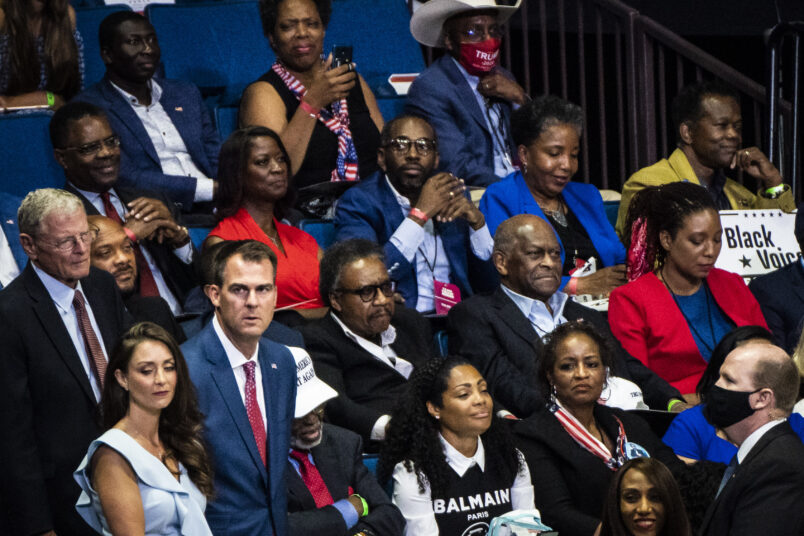
Jet Setting
On her Facebook page, Kutti touted the Trump campaign’s Black Voices For Trump group. She also made a series of posts about attending the former president’s infamous June 20, 2020 rally in Tulsa, Oklahoma, which was plagued by poor attendance and a wave of COVID cases. Kutti was photographed by the press at the event waving a “Black Voices For Trump” sign as she sat alongside VIPs, including Oklahoma Gov. Kevin Stitt (R), former Sen. Jim Inhofe (R-OK), and former Republican presidential candidate Herman Cain, who died from COVID after attending the event.
Kutti’s Facebook posts about the rally included shots of her posing at the event with Cain and Floyd, who she called the “smartest black man in politics.” Two days after the event, she posted a series of pictures that seemed to show her traveling on a private jet with Mike Lindell, the pillow entrepreneur, Trump backer, and prominent election conspiracist.
“NEW CLIENT ALERT: Just inked Mike Lindell on a Gulfstream G650!” Kutti wrote.
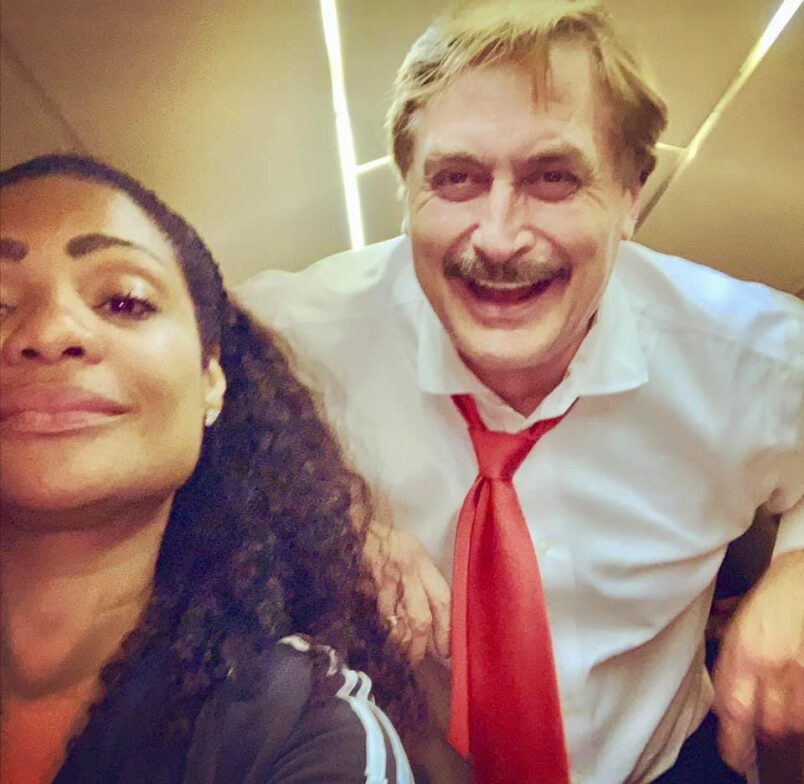
In a conversation with TPM, Lindell said he had no business relationship with Kutti whatsoever. He also objected to her description of his plane.
“I have my own plane and it’s not a Gulfstream … mine’s a Challenger 300 and before that I had a Vulcan 50,” Lindell said.
After being shown the photos, Lindell said he flew some of the attendees from the event on his jet as a favor to “one of the speakers” from the rally. Lindell said he could not recall which person he arranged the flight for beyond remembering that they were on stage at the event.
“They were a bunch of people. They weren’t on … a Gulfstream, that was on my plane and there was … ten people,” Lindell explained, adding, “There was a name on there that I knew on the plane and I did them a favor, whoever it was, because these were all people with them.”
Lindell said he had no dealings with Kutti other than offering her the plane ride and posing for pictures on board.
“I have no idea who this gal is. That’s the only time I’ve ever seen her in my life,” Lindell said. “That’s the first and only time I’ve ever seen her or talked to her.”
‘Just Stopping Short Of The Line’
In addition to a chronicle of her support for and involvement with the Trump campaign, Kutti’s Facebook provides a glimpse into her extreme and bareknuckle brand of politics. Her page includes COVID vaccine conspiracy theories, disparaging comments about the LGBTQ community, and an expression of support for some of West’s anti-Semitic remarks.
An August 2020 profile in the Chicago Sun-Times newspaper detailed Kutti’s political evolution and described how she became an outspoken Trump backer after previously having “supported Democrats like Hillary Clinton in the past.” The paper, which highlighted some of Kutti’s participation in White House events, noted that Kutti was also working on the 2020 campaign of Angela Stanton King, a convicted felon who was pardoned by Trump and unsuccessfully ran for the Georgia House seat that had been occupied by the late Civil Rights icon John Lewis. While she confirmed her involvement with Stanton King, Kutti declined to answer questions from the Sun-Times about whether she was “helping West on his longshot presidential bid that’s been mired in controversy.”
However, it was not support for Trump, working for West, or the Georgia House race that provided Kutti’s entree to the political realm. The newspaper profile described Kutti as having “jumped into Illinois politics” when she began working with Red White and Bloom, a Canadian company that was seeking a license to grow marijuana in the state. According to the Sun-Times, state records show Kutti registered as a lobbyist for the company in January 2020.
As Red White and Bloom pursued its license, Kutti attacked officials in Illinois for their handling of the marijuana industry. Her Facebook posts on the issue included profanity, implied violence, dramatic warnings of “poisonous molded” cannabis crops, and a video where she wandered the State Capitol while declaring it was “game over” for one of her political opponents. Kutti also argued Illinois officials were racist in their handling of the marijuana industry and disadvantaging minority growers even though the company she reportedly registered to lobby for was led by a white management team.
Emailing Red White and Bloom to ask about the company’s relationship with Kutti led to a series of odd responses. TPM’s emailed request for comment was initially answered by Tyler Troup, a managing director of the public relations and investor relations firm Circadian Group, who declared, “The 2020 election was a sham. Anyone with a brain can see that.” After answering a message sent to Red White and Bloom’s address, Troup insisted he was “absolutely not involved” in the company before making a series of political arguments about race and Hunter Biden. Troup did not answer questions about how and why he was responding to messages sent to a Red White and Bloom email account. Subsequently, someone using the same Red White and Bloom general investor relations address that Troup responded to answered with a statement essentially disavowing Kutti.
“The Company sold the entire operation in April 2022 that was subject of a state cannabis licensing application for which she was supposedly engaged to lobby for,” the statement said. “We have no formal record of her contract being executed and there have been no further dealings with Ms. Kutti since the sale of the operation.”
Despite the firm’s distancing from Kutti, in 2020, her efforts earned praise from Red White and Bloom CEO Brad Rogers who described Kutti to the Sun-Times as “a f—ing pit bull.” Others who dealt with Kutti’s work in the cannabis space were far less complimentary.
One Illinois politico who was the subject of criticism from Kutti told TPM they found the volume and tenor of her online attacks “weird and unsettling.” The politico, who requested anonymity due to their concerns about Kutti, said they were not “surprised” when the news about the efforts to pressure Freeman broke. To Kutti’s past target, her conduct in Georgia was simply an “escalating” version of her past behavior.
“What she did in Illinois, she just elevated it,” the politico said of Kutti. “She didn’t show up on doorsteps here. There, she was personally calling and showing up on doorsteps.”
While they were disturbed by Kutti’s conduct, the politico stressed that they were never directly “physically threatened” by Kutti. While the district attorney in Fulton County says Kutti’s behavior went beyond legal bounds, the politico who dealt with her in Illinois said, in the past, Kutti avoided going over the edge.
“She was really good at just stopping short of the line,” the politico said.
Overall, the long and winding saga of Kutti, Lee, and Floyd is further evidence of just how many facets there were to the efforts by Trump and his allies to subvert the will of the voters and keep him in the White House. The story — and the new evidence uncovered by TPM — also shows that even some of the more outlandish aspects of the election scheming have clear connections to Trump and his campaign. And, of course, Freeman’s experience of facing a cascade of threats and the fear of strangers appearing to deliver ominous warnings at her door is a stark example of how Trumpworld’s plotting had a real human cost. In her testimony before the House select committee, Freeman talked about how the experience left her scarred.
“I won’t even introduce myself by my name anymore,” Freeman said. “I get nervous when I bump into someone I know in the grocery store who says my name. I’m worried about who is listening. … I’m always concerned of who is around me. I’ve lost my name, and I’ve lost my reputation. I’ve lost my sense of security.”
For her part, Kutti used Facebook to respond to the indictment. In the wee hours of Tuesday morning, Kutti posted a link to comedian Dave Chappelle’s famous skit about pleading the Fifth Amendment to refuse to testify in court. She included a caption reiterating her support for Trump.
“TRUMP MUHFUKIN 2024,” Kutti wrote before a trio of American flag emojis.


